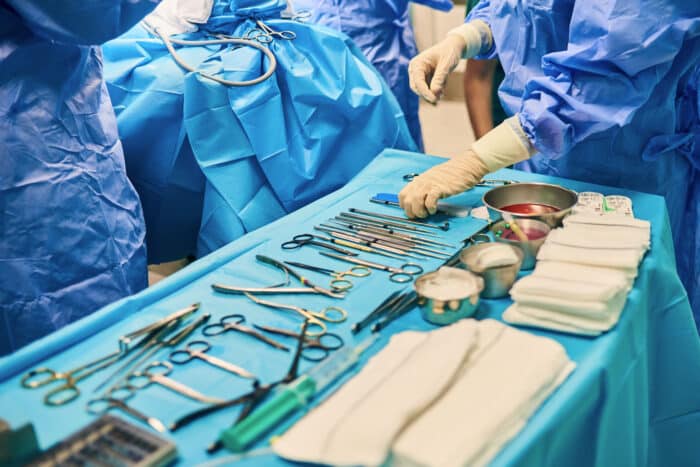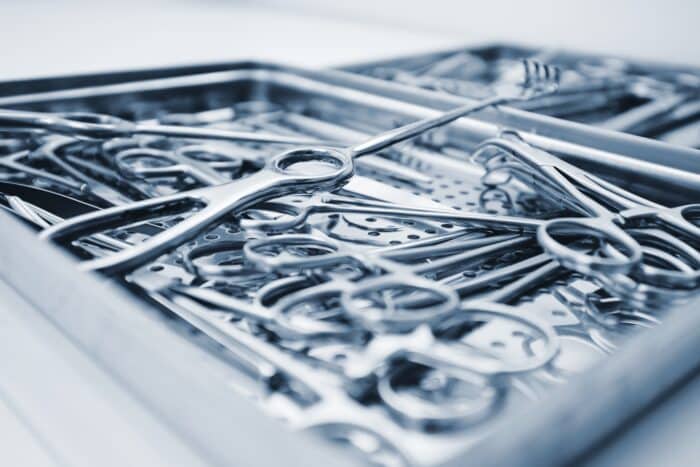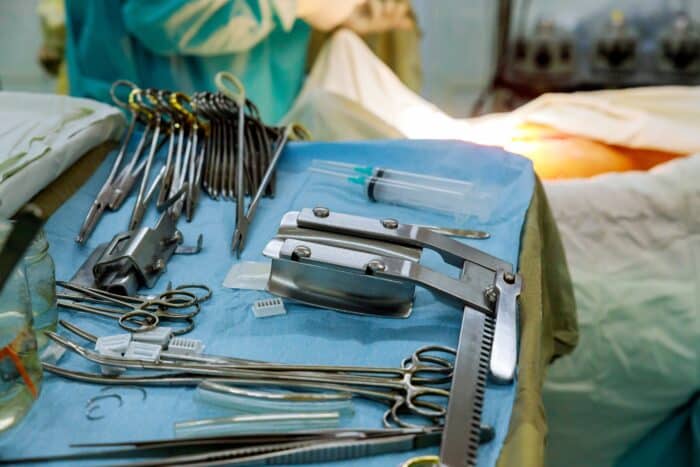If you’re here, you might be interested in pursuing a career in sterile processing, or you might be curious about what it entails.
Sterile processing is one of the best careers to step foot into if you want to enter the world of healthcare, and want to avoid the hefty tuition costs and years of education.
But, who are Sterile Processing Technicians?
Well, sterile processing technicians are healthcare professionals who work in the background of any healthcare facility. They’re the ones responsible for making sure all the medical instruments and equipment used in surgeries and treatments are sterile, clean, and safe to use.
They work diligently to sterilize, disinfect, and organize all these crucial tools, ensuring that hospitals and clinics maintain the highest standards of cleanliness and safety.
Now, you might also be wondering if there are any exams you need to take to become a sterile processing technician, and whether getting certified is important.
In this article, we will discuss everything you need to know about certification and exams. From what it covers to how to prep smarter (not harder), we’ve got you covered.
So, if you’re ready to uncover the secrets behind taking this test and stepping into this vital healthcare role, buckle up!
Read: What is a Sterile Processing Technician
What Do Sterile Processing Technicians Do?
Sterile Processing Technicians play an important role in maintaining the cleanliness and safety of medical equipment used in healthcare settings.
Their responsibilities revolve around the sterilization, cleaning, inspection, and maintenance of surgical instruments and medical devices.
Some of their key tasks include:
1. Sterilization: They operate sterilization equipment, ensuring that instruments and equipment are thoroughly sanitized and free from harmful microorganisms.
2. Inspection and Assembly: They carefully inspect instruments for damage or defects, assemble instrument trays, and package them appropriately for sterilization.
3. Inventory Management: They manage inventory, ensuring an adequate supply of sterile instruments and equipment for medical procedures.
4. Compliance and Quality Control: They follow strict protocols and guidelines to maintain compliance with industry standards and ensure the quality of sterilization processes.
5. Collaboration: They work closely with healthcare professionals, including surgeons, nurses, and other staff, to provide sterile instruments for procedures and surgeries.
6. Record-Keeping: They maintain detailed records of sterilization processes and equipment maintenance to ensure accountability and traceability.
See More: What Does a Sterile Processing Technician Do?
What Are Certified Sterile Processing Technicians?
Certified Sterile Processing Technicians are professionals who have undergone specialized training and obtained certification in the field of sterile processing. They have demonstrated proficiency in maintaining the cleanliness, sterilization, and proper handling of medical instruments and equipment used in healthcare settings.
To become certified, you would typically need to complete a formal education or training program or gain relevant work experience in sterile processing. They then sit for a certification exam, such as the Certified Registered Central Service Technician (CRCST) exam, administered by organizations like the International Association of Healthcare Central Service Materiel Management (IAHCSMM) or other certifying bodies.
Even though certification is not mandatory for all states, it is highly preferred by employers since they value certified candidates over uncertified ones.
Certification validates their knowledge of industry standards, infection control practices, sterilization techniques, equipment handling, and quality assurance measures.
Learn more: Certified Sterile Processing Technician
Sterile Processing Technician: Types of Exams
Becoming a sterile processing technician is not as difficult or intimidating as it sounds. Three types of sterile processing technician certification exams are the most common and legitimate.
Exams for becoming a Sterile Processing Technician usually revolve around certification to demonstrate proficiency in maintaining cleanliness, sterilization, and proper handling of medical instruments.
Each exam aims to ensure that individuals working in this critical healthcare role have the necessary knowledge and skills to maintain a clean and safe environment for medical procedures. Passing these exams demonstrates competence and dedication to upholding industry standards in sterile processing.
Here are a few types of exams commonly associated with this role:
CRCST Exam (Certified Registered Central Service Technician):
Offered by the International Association of Healthcare Central Service Materiel Management (IAHCSMM), this exam assesses knowledge of sterilization techniques, infection control, equipment handling, and regulatory guidelines.
CSPDT Exam (Certified Sterile Processing and Distribution Technician):
Provided by the Certification Board for Sterile Processing and Distribution (CBSPD), this exam evaluates expertise in cleaning, packaging, sterilization, and distribution of medical devices.
CIS Exam (Certification in Sterile Processing):
Administered by the Certification Board for Sterile Processing and Distribution (CBSPD), this certification exam assesses proficiency in sterile processing practices, infection control, and safety measures.
Now that you know the basics of each of these certifications, let us delve deeper into each certification exam.
CRCST Exam (Certified Registered Central Service Technician):
– Administered by: International Association of Healthcare Central Service Materiel Management (IAHCSMM).
– Focus: Evaluates knowledge in sterilization techniques, infection control, equipment handling, and regulatory guidelines.
– Exam Structure: Consists of 150 multiple-choice questions.
– Duration: 3 hours to complete the exam.
– Passing Score: Usually requires a score of 70% or higher to pass.
How to prepare for this exam:
IAHCSMM offers various study materials like textbooks, online courses, and practice exams. Reviewing textbooks and utilizing online resources covering topics on sterilization, infection control, and equipment handling is beneficial.
The exam fee ranges from $125 to $200 for IAHCSMM members and $225 to $300 for non-members.
CSPDT Exam (Certified Sterile Processing and Distribution Technician):
– Administered by: Certification Board for Sterile Processing and Distribution (CBSPD).
– Focus: Tests expertise in cleaning, packaging, sterilization, and distribution of medical devices.
– Exam Structure: Comprises 150 multiple-choice questions.
– Duration: 3 hours for completion.
– Passing Score: Typically requires a minimum score of 70% for passing.
How to prepare for this exam:
CBSPD offers study guides, textbooks, and online resources for exam preparation. Studying topics like cleaning methods, sterilization techniques, and regulations is essential. The exam fee is approximately $125 to $150.
CIS Exam (Certification in Sterile Processing):
– Administered by: Certification Board for Sterile Processing and Distribution (CBSPD).
– Focus: Evaluates proficiency in sterile processing practices, infection control, and safety measures.
– Exam Structure: Comprises 100 multiple-choice questions.
– Duration: 2 hours to complete the exam.
– Passing Score: Generally requires a score of 70% or higher for passing.
How to prepare for this exam:
Similar to the CSPDT exam, CBSPD provides study materials, including textbooks and online resources. Focus on topics such as sterilization methods, infection control, and safety protocols. The exam fee ranges from $125 to $150.
The general advice to best prepare for these certification exams is to study relevant textbooks and materials provided by the certifying bodies. Utilizing practice exams to familiarize yourself with the exam format and types of questions. Participating in study groups or online courses specifically designed for exam preparation can also help.
One more important thing to remember is that costs and exam structures may vary, so it’s advisable to visit the respective certifying bodies’ websites for the most current and detailed information.
Read more: Sterile Processing Technician Certificate Program Online
Also see: Sterile Processing Technician Certification
Top 5 Sterile Processing Technician Skills
Now that you know everything about sterile processing technician certification exams, you might be curious about the top skills you need to incorporate to become one.
Well, we’ve got you covered with that today.
Here are the top five essential skills for Sterile Processing Technicians:
Attention to Detail:
Precise attention to detail is very important. Sterile Processing Technicians must thoroughly inspect, clean, assemble, and sterilize medical instruments and equipment. They need to ensure that every item meets strict cleanliness and safety standards.
Technical Proficiency:
Proficiency in operating and understanding various sterilization equipment and machinery is essential. They should be familiar with using autoclaves, ultrasonic cleaners, and other specialized devices used in the sterilization process.
Knowledge of Sterilization Techniques:
Having a comprehensive understanding of different sterilization methods and techniques is vital. This includes knowledge of chemical disinfection, steam sterilization, and other methods ensuring the proper sterilization of medical equipment.
Compliance with Safety Protocols:
Adherence to strict safety protocols and regulatory guidelines is crucial. Sterile Processing Technicians must follow established protocols to prevent infections and ensure the safety of patients and healthcare staff.
Communication and Collaboration:
Effective communication skills are important for interacting with healthcare professionals and team members. They need to collaborate closely with surgeons, nurses, and other staff to ensure the availability of sterilized instruments for medical procedures.
See: Travel Sterile Processing Technician
Sterile Processing Technician – FAQs
How much do Sterile Processing Technicians earn?
According to the U.S. Bureau of Labor Statistics (BLS), the average annual income for sterile processing technicians is $44,940, or $21.61 per hour.
It is important to note that these figures are highly dependent on several influencing factors such as job location, experience, certifications, and more.
Which certification exam is the best for Sterile Processing Technicians?
The choice of which certification exam is best for Sterile Processing Technicians often depends on individual preferences, employer requirements, and career goals.
However, two primary certifications stand out within the field: the CRCST (Certified Registered Central Service Technician) offered by the International Association of Healthcare Central Service Materiel Management (IAHCSMM) and the CSPDT (Certified Sterile Processing and Distribution Technician) provided by the Certification Board for Sterile Processing and Distribution (CBSPD).
Related Resources:
- How to Become a Sterile Processing Technician
- Sterile Processing Technician Salary
- Sterile Processing Technician Job Description
- Sterile Processing Technician Requirements
- Sterile Processing Technician Resume
- Sterile Processing Technician vs. Surgical Technologist
- Sterile Processing Technician Training
- Sterile Processing Technician School
- Sterile Processing Technician Certificate Program
- Sterile Processing Technician Course
- How Long Does it Take to Become a Sterile Processing Technician
- Sterile Processing Technician Training Program Cost
- CRCST Certification
Related Articles
-
How to Be Successful in College in 2022 – 7 Simple Tips to Succeed
-
How Do Scholarships Work? Read This First…Truth is Shocking
-
7 Best College Majors 2024: What Should I Major In?
-
How to Choose a College – 10 Things You Must Consider in 2024
-
Why Go to College? Top 13 Benefits for Adult Students in 2022
-
Top 5 Best Alternatives to Community College for 2024








